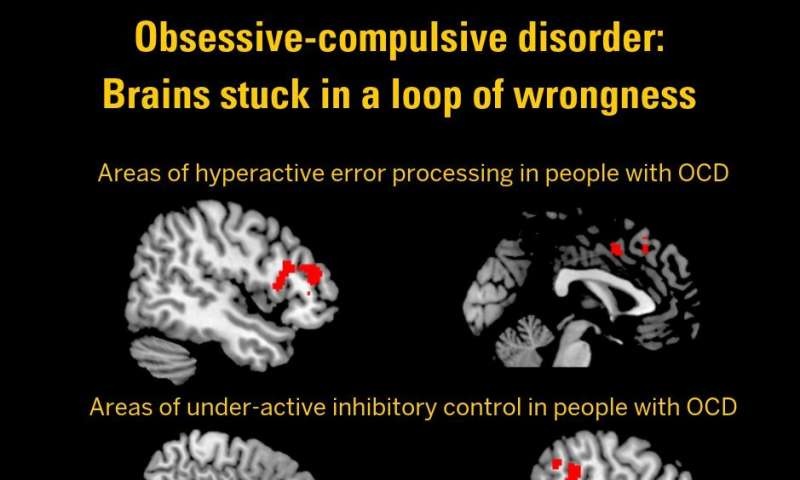Adelaide Miller has a terrific read, with first-hand testimonials, on living with Obsessive-Compulsive Disorder.
There are some gripping examples, but the piece brings up a couple, really important points.
a) OCD isn’t always just about Howard Hughes-ian handwashing, organizing things perfectly, arranging, contamination, and all the other popular representations.
You can have OCD about anything.
b) Often, OCD resides entirely in your head without the attendant rituals.
It’s unwanted and intrusive mental thoughts that refuse to give your mind a break.
Consequently, you can live quite a normal life, on the outside, while you’re absolutely tortured, inside.
No one sees you engage in all the physical rituals that accompany some forms of OCD, and so you can live a long time as a “normal person” without a proper diagnosis.
All forms of OCD are brutal, but this a particularly difficult kind because, as the article notes, the longer we go undiagnosed, the harder it is to eventually treat.
I started having obsessive thoughts about going to hell at 4 years old, but there were no external rituals to ease that thought, and so no one recognized my OCD the way they would if I were obsessive about hand-washing.
Eventually, that mental obsession ceased, but there were always replacements, lined up on the bench, ready for their starring role.
Now I want to say something that the article doesn’t address.
What role does Christianity (if any) play in this?
Well, some Christians would counter: “Well, if you’re having an unwanted, intrusive thought, just think about Scripture.”
There’s a problem with that.
You can fixate on any number of Scriptural issues to the point where it becomes severely intrusive, unwanted, and debilitating.
God’s sovereignty and man’s free will? It’s almost a cliché to bring that one up, but of all the books and countless perspectives I’ve read, none has come close to resolving the mystery.
“Examine yourself, to see whether you are in the faith. Test yourselves”. 2 Corinthians 13:5. Thanks, Paul. That’s been the bane of Christians with OCD for thousands of years.
Jesus, in Matthew 5: “If you are sued in court and your shirt is taken from you, give your coat too.”
Yes, he’s laying out a principle, but how do we live out that principle? A lot of Christians are willing to sweep that under the rug as a conscience-issue, but people with OCD don’t sweep anything under the rug.
There is no rug.
The point is that if you direct Christians with OCD towards Scripture, they’ll just apply their mental (or pure-O) OCD in that direction.
The problem isn’t Scripture, the problem is OCD, and you can’t treat OCD with Scripture, because there are 66 books in the Bible, with innumerable puzzling stories and verses that have inspired fierce theological debates, countless denominations, and actual catapult-and-sword, nation-state wars over interpretation.
I love my Bible.
Therein lie the words, the being, the salvation of Christ, my Lord and Savior, and the one who makes this whole mess of life worth it because there’s a resurrection where our minds and bodies will finally be free and perfect and at rest.
But as someone with OCD, it’s also inspired sometimes-debilitating “religious scrupulosity,” which Jesus never intended. He said his burden is light.
It’s not Christ’s fault, it’s the fact we all live with challenges from a fallen world.
So if you “treat OCD with Scripture,” you’ll have OCD over your Christianity just like some people have it over contamination or literally anything, because you can have OCD about anything.
c) If any ritual, if any thought, if anything is causing you severe distress, talk to a doctor. Just get checked out.
In Miller’s article, she interviews Dr. David Cooper, who says that early treatment is vital:
“Biologically, brain imaging studies have found that brain changes related to OCD, structure and circuitry, increase with age,” Mr Cooper said.
“The longer someone lives with OCD, the more their brains might change to support its processes.
“Socially, the longer someone lives with OCD the more likely they are to organise their lives to accommodate it.
“Family members often end up participating in compulsions. People will choose careers, friends or activities that allow them to avoid triggers or perform compulsions.
“The way their lives are organised around OCD serves to maintain the disorder.
Finally, Miller points out some forms of treatment for therapy, which include Exposure and Response Prevention, Acceptance Commitment Therapy, and/or medication.
I’d like to add one more thing — last year, researchers discovered a potentially fascinating and wonderful new way of treating OCD by treating our immune system. It’s still far too early to be practiced, clinically, but the science is promising and, I hope, offers some comfort that, yet again, we can trace these mental challenges to our bodies and the way they malfunction.
For example, this is a brain with OCD, courtesy of this study.

It’s not your fault. And there are far more people with this out there than you think (and you – and I — think a lot).
[Photo: Pexels, free stock photographs]

